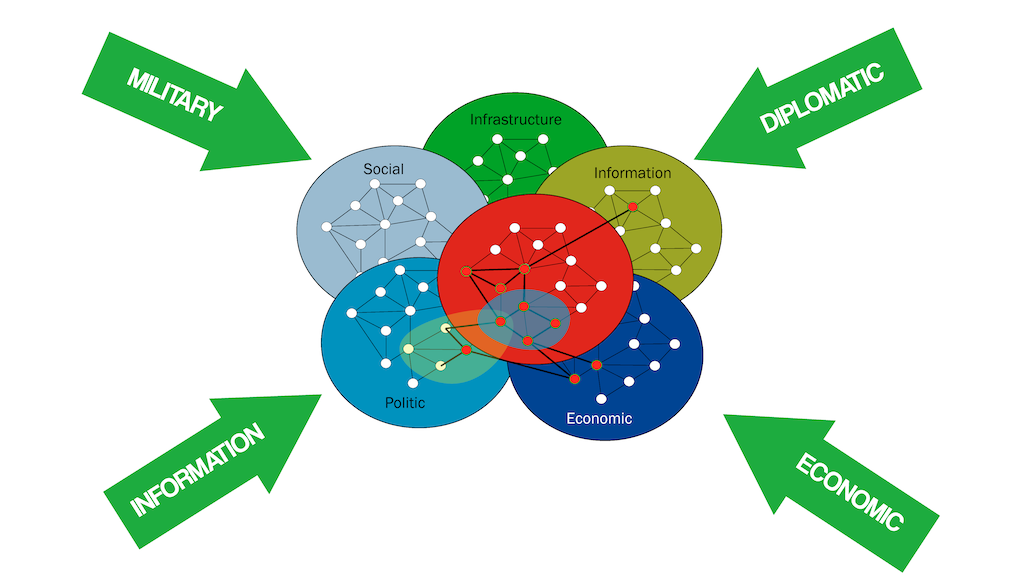COMPREHENSIVE APPROACH (INTEGRETED APPROACH IN EU)
MODERN STATE STRATEGY AND COMPREHENSIVE APPROACH” Every effect has a cause, all intelligent effect has an intelligent cause, the power of the cause is due to the magnitude of the effect. “
Nowadays an efficient crisis management must be based on a comprehensive approach for a national strategy to be implemented.
Understanding multilateral challenges and procedures is critical to any contribution to a regional or international conflict resolution process.
The skills required to understand and design such an approach have to be acquired at all level of commands.
In the current international context, crisis requires regional and international solutions: broad term security against state and non-state actors, protection of energy resources and flows, failing or failed states are no longer at the reach of any given nation.
A comprehensive approach strategy represents the recognition that the military alone cannot resolve such crises or conflict.
There is a need for more deliberate and inclusive planning and action through established crisis management procedures that allow both military and non-military resources and efforts to be marshalled with a greater unity of purpose.
Effect oriented approach to operations

Inculcate a culture
Adopting such a “Comprehensive Approach” to operations begins with inculcating a culture of active collaboration, transparency and coherent response among those involved in crisis management.
This includes the development of process and structures to ensure the proper implementation of an effective coordination and cooperation with non-military actors to complement and the mutual reinforcement of each other’s efforts to achieve common goals, ideally within an overall strategy agreed and owned by legitimate local authorities.
Planning in a multi-dimensional environment generates particular challenges for both civilian and military actors. Experience shows that there may be no formally appointed lead agency or “super-coordinator”.
Rather, a “comprehensive approach” emerges through the determination of various actors to play their part to resolve a crisis. Pragmatism is often the way forward, as imperfect as this may be in an otherwise rules-based society.
This context defines, inter alia, today’s engagement of a country’s political, diplomatic, economical and military instruments of power. Coalition, formal of ad-hoc, is the new norm of modern conflicts. But reaching consensus in a coalition is hard work: different national interests, different political objectives and different resources willing to be committed compete to draw a combined acceptable solution.
Leading a coalition or being part of it means that national representatives will have to contribute as key leaders in decision making bodies. As a consequence, those key individuals will have to understand and be capable of interacting in commonly agreed processes and procedures. Influencing decision in multinational coalition is certainly one of the main strategic objectives today.
This goal depends on three conditions:
- Being able to develop and implement relevant strategy along all instruments of power;
- Being able to convey this strategy through interoperability;
- Being able to lead coalitions or contribute to them efficiently.
NATIONAL KNOW-HOW
Mastering the processes leading to conceive and develop strategy is not only an operational matter; it is also a cultural label, an evidence of a national savoir-faire.
This expertise may be exported through the creation of centers of excellence or regional military exercise which radiate the national knowledge and skills.
A need for methodology
NATO and EU have developed powerful but complex planning processes which allow collaboration within big coalition. These processes can be adapted to smaller countries and organization. Mastering these processes strengthen influence on the international scene.
Developing a strategy within the military is conducted by applying a combination of operational art and science. Commanders provide the vision, based on their experience and intuition, supported by their understanding of the staff requirement and processes.
The staff provides thorough analysis conducted using standardised processes and formatted products in order to offer practical solutions to complex problems, supporting commanders’ visions.
Operational art and science are the skilful employment of military forces to attain strategic and/or operational objectives through the design, organisation, integration and conduct of theatre strategies, campaigns, operations and battles.
It is an essential aspect of operations planning. It comprises the skills, imagination, creativity and intuition to plan and conduct the deployment and employment of joint multinational forces and capabilities, together with other means, in a series of related operations over time and space to achieve the end-state.
Those skills require a common language: the method by which the different concept manipulated to design operational solutions are analysed, sequenced and organised to produce an articulated plan, followed by precise execution and assessment processes.
A COMMON LANGUAGE


